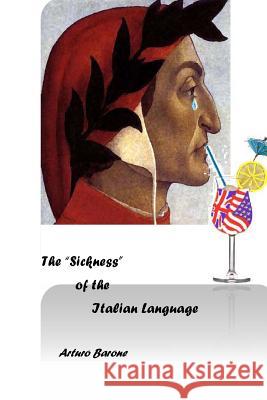The sickness of the italian language: Is American-English destroying the world's most beautiful language? » książka
The sickness of the italian language: Is American-English destroying the world's most beautiful language?
ISBN-13: 9781512317633 / Angielski / Miękka / 2015 / 140 str.
The sickness of the italian language: Is American-English destroying the world's most beautiful language?
ISBN-13: 9781512317633 / Angielski / Miękka / 2015 / 140 str.
(netto: 26,94 VAT: 5%)
Najniższa cena z 30 dni: 27,90
ok. 16-18 dni roboczych.
Darmowa dostawa!
This pamphlet is dedicated to those English-speaking lovers of Italian who believe that the integrity of the most beautiful language in the world should not be surrendered to the vagaries of Anglo-American jargon. It is almost impossible to calculate how many words there are in any language. The only practical way is to try to identify those words that are considered fundamental and of these, those that are more commonly used. It has been calculated that the Italian language has about 260,000 fundamental words. Of these, 10,000 are generally known but only 2,000 are used on a daily basis. The percentage of foreign, mainly American-English, terms used by present-day Italians is said to vary between 1.7% and 8% of the total words in the Italian dictionary; no assessment has been made of what the percentage is of the 2,000 words in common use... One does not have to be a mathematical genius to draw a moral from these figures... If, as this essay aims to show, the Italian language is sick, the fault is ours, the Italians'. We must suffer from the same malady; after all, language is but a tool to communicate, make ourselves understood, and express our views, our desires. It is us. We, the Italians, wallow in an orgy of self-deprecation and linguistic masochism, which are an offence to our dignity and traditions and neglectful of the language of art, music, food and style. Arturo Barone is a retired solicitor, born in London of Neapolitan parents. He completed his studies in Italy where he took his first Law Degree. In this booklet he considers, with a highly critical eye, the deterioration in the use of the most beautiful language in the world as a result of the influence of English and American terms and expressions. He records the circumstances in which the impact of American and English 'culture' have developed at an ever-increasing pace since the end of the Second World War, reaching the conclusion that neither has been linguistically beneficial for Italy; more particularly, he considers the consequences that the indiscriminate abuse of an alien manner of speaking has had on the psyche of the average Italian. He maintains that his compatriots are oblivious both to the linguistic and to the psychological detriment of accepting as normal, if not desirable, the use of English and American words.
Zawartość książki może nie spełniać oczekiwań – reklamacje nie obejmują treści, która mogła nie być redakcyjnie ani merytorycznie opracowana.











